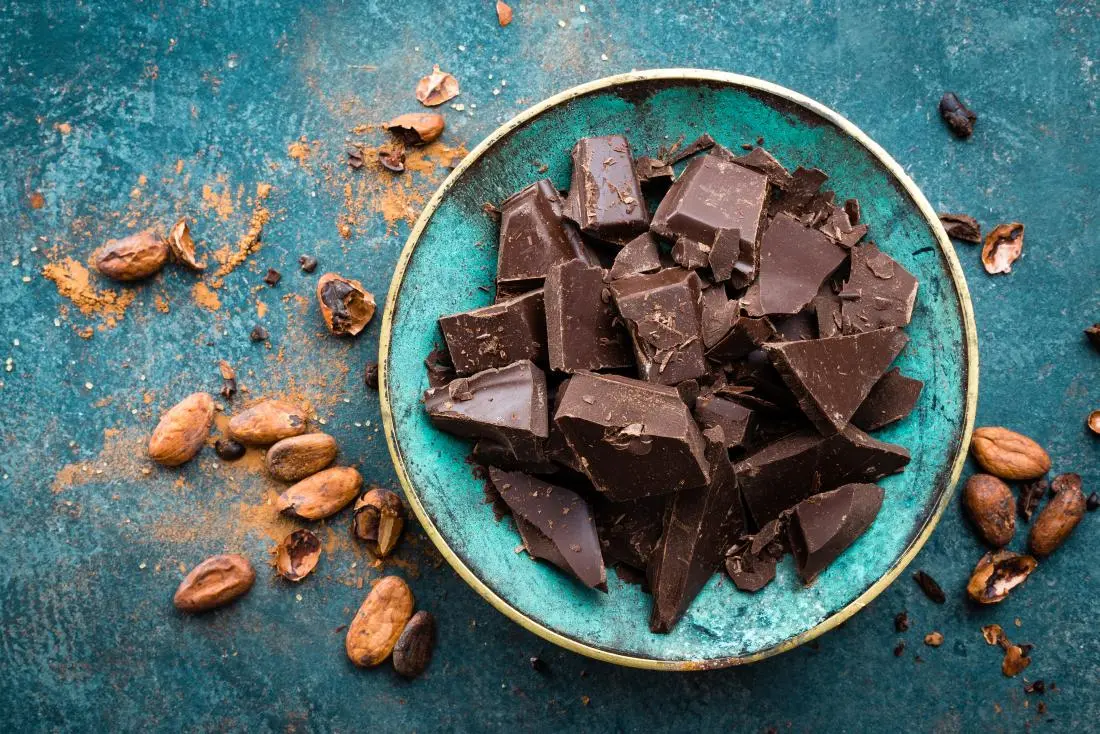There are several nutrients in dark chocolate that are good for your health.
One of the finest sources of antioxidants is cocoa, which is derived from the cacao tree’s seed.
According to studies, dark chocolate can enhance your health and reduce your chance of developing heart disease.
Read More: “Fueling Your Body with Color: What Your Nutritionist Wants You to Know”
Here are 7 scientifically proven health advantages of dark chocolate or cocoa.
1. Very Nourishing
If you get premium dark chocolate with a high cocoa content, it is very nourishing.
It is rich in minerals and has a fair level of soluble fibre.
A 100-gram bar of 70-85% cocoa dark chocolate has the following ingredients:

- Fibre 11 grammes
- 66% of the iron DV
- 57% of the magnesium DV
- 196% of the copper DV and 85% of the manganese DV
- It also contains large amounts of selenium, potassium, phosphorus, and zinc.
Naturally, 100 grammes (3.5 ounces) is a substantial serving size and not something you should consume often. Additionally, these nutrients contain 600 calories and a little bit of sugar.
2. May Reduce Blood Pressure and Enhance Blood Flow
Nitric oxide (NO) production by the endothelium, the lining of arteries, may be stimulated by the flavanoids in dark chocolate .
One of NO’s jobs is to tell the arteries to relax, which lowers the blood flow resistance and lowers blood pressure.
Although the benefits are often modest, several controlled studies have demonstrated that cocoa and dark chocolate can enhance blood flow and reduce blood pressure.
Take this with a grain of salt, though, as one research in persons with type 2 diabetes and high blood pressure found no impact (8Trusted Source). It’s conceivable that adding cocoa flavanols to the diet won’t provide any further benefits for persons who are already taking medication for high blood pressure.
It is obvious that further study is required given the significant differences across studies on this topic.
3. Strong Antioxidant Source
Oxygen radical absorbance capacity is referred to as ORAC. It is a gauge of a food’s antioxidant capacity.

In essence, scientists test a sample of a meal against a group of harmful free radicals to examine how well the antioxidants in the food can neutralise the free radicals.
These research suggest that chocolate contains a lot of antioxidants. However, because ORAC is evaluated in a test tube and could not have the same impact on the body, its biological significance is contested.
The breadth of antioxidant benefits of chocolate has not always been studied in humans. However, experts claim that the evidence is insufficient to make a definitive statement.
Organic substances that are physiologically active and serve as antioxidants are abundant in dark chocolate. These include, among others, catechins, flavanols, and polyphenols. When paired with other foods like almonds and cocoa, the polyphenols in dark chocolate may help decrease some types of LDL (“bad”) cholesterol, according to studies.
According to a research, including blueberries and acai berries, cocoa and dark chocolate exhibited greater antioxidant activity, polyphenols, and flavanols than any other fruit evaluated ().
4. Might Enhance Mental Performance
The good news is still coming. Additionally, dark chocolate may help your brain work better.
According to studies, young individuals who consume rich flavanol chocolate have better blood flow to their brains. This may help to explain why drinking cocoa regularly seems to enhance language learning, attention, and memory.
Additionally, cocoa flavanoids may assist older persons with moderate cognitive impairment preserve cognitive function and lessen the likelihood that dementia may develop. However, additional study is required.
Another factor contributing to cocoa’s ability to temporarily enhance brain function is that it includes stimulants like caffeine and theobromine.
5. Increases HDL and Protects Against Oxidation of LDL
Dark chocolate consumption can lower numerous significant heart disease risk factors. It could guard against elevated cholesterol.

According to a tiny study, consuming dark chocolate with the flavanol lycopene added dramatically reduced levels of triglycerides, LDL (“bad”) cholesterol, and total cholesterol.
Some LDL cholesterol variants have a higher propensity to oxidise, which occurs when they come into contact with free radicals in your body. The LDL particle itself becomes reactive due to oxidation and is capable of causing damage to various tissues, including the lining of the arteries in your heart.
It makes complete logic that cocoa reduces LDL that is prone to oxidation. It is loaded with potent antioxidants that do enter the circulation and shield lipoproteins from oxidative damage.
Another prominent risk factor for illnesses like diabetes and heart disease, insulin resistance, can be decreased by the flavanols in dark chocolate.
Also, Read- Transform Your Mental Health with These 6 CBT Techniques.








